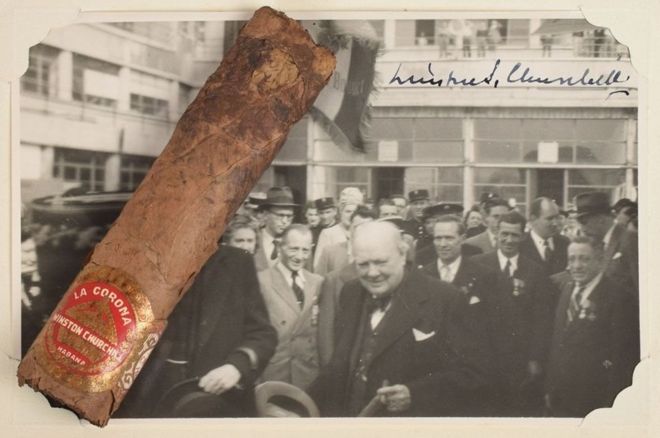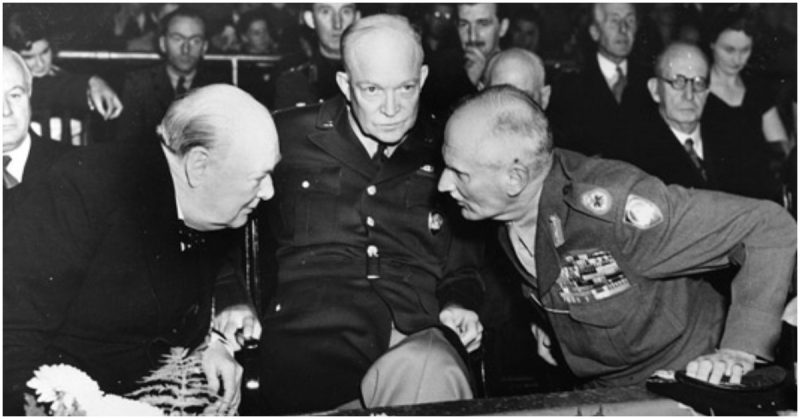Everybody knows the classic image of Sir Winston Churchill with his trademark cigar. It’s an iconic image, and the cigar has become synonymous with the man himself. No representation of Churchill is complete without the classic cigar in place. These days, though, one of Churchill’s cigars is a rare and valuable collector’s item!
When visiting Paris in 1947, Churchill left half a cigar unsmoked. The other half was discovered in the Le Bourget Airport by Corporal William Alan Turner, a British airman.
That 4 inch (10 cm) Cuban cigar sold for $12,000 (£9,000) at an online auction run by RR Auction based in Boston. The cigar was purchased by a collector from Palm Beach, FL. The buyer was not identified.
According to the auction company, Churchill smoked the cigar at the French airport on May 11, 1947. Included with the cigar was an autographed picture of Churchill, in the company of some French servicemen, smoking the cigar at the airport.
The cigar was specially made for the British Prime Minister. The red and gold band on it includes his last name along with the words “La Corona” and “Habana.”
Turner was a member of the crew that flew Churchill and his wife to and from Paris. He took the picture of Churchill at the airport that was included with the cigar. On it, the former Air Quartermaster had written that he took the photo on May 11, 1947, and that the prime minister had stubbed the cigar out in an ashtray from which the airman collected it.

Churchill was in Paris to receive the Medaille Militaire, the highest military honor in France. He received the award at Les Invalides. The Hôtel des Invalides was originally commissioned in 1670 by Louis XIV to be a place for wounded soldiers to recuperate. Napoleon Bonaparte visited there three times during his reign. After his death, a chapel was built at the site which has contained his remains in a sarcophagus in an uncovered crypt since 1861.
Winston Churchill is known as one of, if not the, greatest statesmen of the Twentieth Century. He took office as the prime minister of Britain in May 1940 at the beginning of World War II.
His speeches rallying the British morale and strength during the difficult times of the war are some of the most famous and quoted works in the history of British literature. It was Churchill who convinced the US to provide aid in the form of the Lend-Lease program, supplying ammunition, guns, tanks, and planes to the Allies even before the US had entered the war themselves.
Though he was one of the primary influencers on the Allied strategy that won WWII, he was voted out of office just two months after the Germans surrendered in 1945. He spent the next several years warning of the dangers of Communism and was the one who coined the phrase “Iron Curtain” in reference to the spread of the Soviet empire throughout Europe.
In 1951, Churchill was voted back into office as prime minister at 77 years of age. He spent four years in office unsuccessfully trying to broker a treaty between the Soviets and the West.
Queen Elizabeth knighted Churchill into the Order of the Garter in 1953. He died in 1965, just one year after retiring from Parliament.
Churchill’s appreciation of Cuban cigars is well-documented. It is estimated that he smoked over 3,000 cigars a year – over 250,000 over the course of his life. His wife made him a cigar bib because his ashes burned so many holes in his clothes. The Royal Air Force designed a special oxygen mask for him that would allow him to continue smoking during high-altitude flights.
During the Blitz in 1941, his favorite cigar shop, Dunhill’s, was destroyed by German bombs. The owner of the shop, Alfred Dunhill, personally called Churchill to assure him that his favorite cigars had survived the attack.
